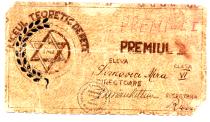The Simovicis
This is me on the right, Mira, an elementary school little girl, my sister, Julieta, a high school girl of 15, and our father, in 1934. I was 8, because I was born in 1926. The photo was taken in a studio called 'Ilarion and Mihalcescu' in Ramnicu Valcea.
My father was rather stingy. This was a natural thing, given the fact that he had been so poor and had worked so hard to become rich. He sometimes argued with my mother because of that. My mother went shopping. Linen was not sold by the meter, but by the bundle. At the end of the year, when tradesmen closed their books, my poor father would find out that his wife had emptied the store. He would come home yelling: 'What need did you have for all those things?' My mother always told him: 'Relax, Maere, we have two daughters and they both need good dowry.' - 'Are they going to leave in a cart? Because all these things will only fit in a cart, you know.' But my mother kept buying and Grandma kept sewing.
My parents were very austere. No kissing, no saying 'I love you', no hugging. I'm not sure I ever saw them kissing. They didn't kiss us too often either. Grandma sometimes called me Caralinda, which means 'my dear' in Ladino or something like that. I was Caralinda.
My sister is 6 years older than me. The two of us were the only Jewish girls in our high school. After my sister left, I was the only one. She got the school's first prize for eight years in a row. I only got the second or third prize in my class, never the first. Because we got all those prizes in school, my sister and I had earned some esteem that had nothing to do with who our father was. For instance, I was in the same class with the daughter of the National Bank's governor, Iliescu. In a town of 10.000 people, this man was like a king. He lived upstairs from the bank. Once a year I was invited to Irina Iliescu's birthday party. This made my poor father very proud, because he had never set foot in the house of a dignitary. 'My girl is going to the governor of the National Bank to visit his daughter! Imagine that!' I would greet Mr. Iliescu with 'Saru-mana' [Ed. note: Old, contracted greeting meaning 'I kiss your hand'. Its use today may vary with the age, the education, the geographical area and even the gender of the interlocutors, but it is mainly reserved for informal interactions between a man and an older, less educated woman, in which only the man uses it.] At that time, 'Saru-mana' was used when addressing men too. What I'm trying to say is that my sister and I became rather famous in Ramnicu Valcea by ourselves.
We took piano lessons from a Russian refugee, Madame Verbinskaia. I wasn't talented and I wasn't diligent either. Our father also hired a French teacher and a German one - 'pope' Mangesius, the protestant minister of Ramnicu Valcea. My sister speaks German beautifully. As for me, they had to catch me first before making me take those lessons.
I read a lot. Our father gave us money to buy books to read, and I read a lot. I acquired this taste for reading in my childhood and I still like to read. My eyes now get tired very fast, but I did read a lot. My father had only attended two years of elementary school, so what could he have possibly read? He could barely write.













